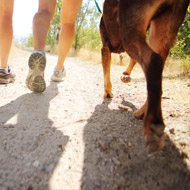Scientists discover potential treatment for Alabama rot

CRVG first emerged in the UK in 2012.
Dogs affected by cutaneous and renal glomerular vasculopathy (CRVG) - or Alabama rot - could soon be offered a new treatment thanks to a discovery by researchers at the RVC’s Queen Mother Hospital for Animals.
A study published in Frontiers in Veterinary Science reports that two out of six dogs suffering from the disease were cured by a treatment known as Therapeutic Plasma Exchange (TPE) or ‘Plasmapheresis’.
The technique involves filtering the patient’s blood so that toxic substances - including those that cause CRVG - are removed. The blood is then returned to the patient after it has been altered.
Researchers say they developed the treatment after a discovery of similarities between CRVG and thrombotic microangiopathy in humans, which is also treated with plasma exchange.
Study author Dr Stefano Cortellini said: “Despite the fact that only a third of dogs treated with TPE recovered from their disease, this is the first time that dogs so severely affected by CRGV have been reported to survive and so we remain optimistic that TPE may play an important role in the treatment of this deadly disease.”
First identified in Alabama in the 1980s, CRVG causes small clots in blood vessels, which lead to skin ulcers, tissue damage and, in many cases, kidney failure. A lack of understanding about how the disease spreads has led to high death rates in dogs that develop it.
CRVG first emerged in the UK in 2012 and has since affected more than 150 dogs from 37 counties. Theories about the cause of the disease have ranged from E.coli-produced toxins to bacteria and parasites.



 The Veterinary Medicines Directorate (VMD) is inviting applications from veterinary students to attend a one-week extramural studies (EMS) placement in July 2026.
The Veterinary Medicines Directorate (VMD) is inviting applications from veterinary students to attend a one-week extramural studies (EMS) placement in July 2026.